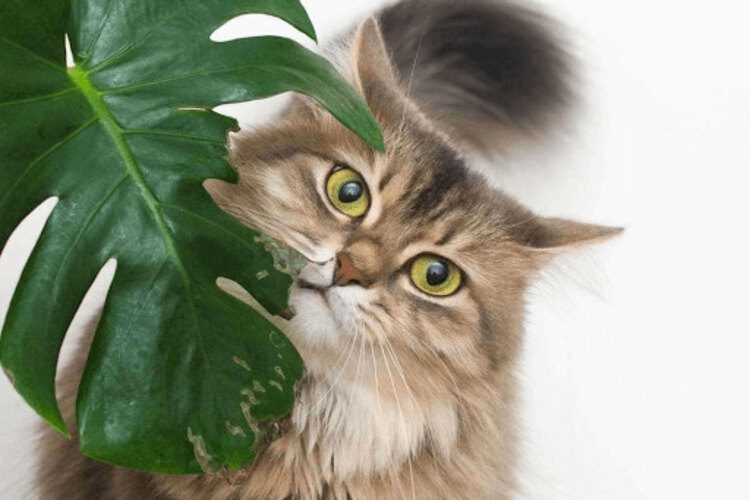Sign up for our newsletter
Get Swipe Garden's independent reviews, and expert advice sent straight to your inbox.
For information privacy practices, read our Privacy Policy.
Sign up for our newsletter
Get Swipe Garden's independent reviews, and expert advice sent straight to your inbox.
For information privacy practices, read our Privacy Policy.
Sign up for our newsletter
Get Swipe Garden's independent reviews, and expert advice sent straight to your inbox.
For information privacy practices, please read our Privacy Policy.

If you have a cat at home, you should definitely keep an eye on your indoor garden. “Are Monsteras toxic to cats? The answer is yes.
Thanks to its beautiful tropical foliage, Monstera Deliciosa is one of the most popular houseplants. Also known as the “Swiss cheese plant” or the “split-leaf Philadelphia tree,” these plants are relatively low-maintenance, making them an attractive interior plant choice for any home. However, if you’re worried about whether the Monstera plant is toxic to cats and how to keep your cat safe, don’t skip this post.
Even though Monstera’s benefits are many for humans, most parts of your poisonous houseplants, like the stems, leaves, roots, and even the unripe fruit, have calcium oxalate crystals because the sap flows everywhere. When a cat eats any part of the plant, the insoluble calcium oxalates in the plant can cause many allergic reactions, and in most cases, the reaction is fatal. In conclusion, your cat should be kept far away from your Monstera plants because all sections of the plant can be mildly toxic to your cat.

Monstera is a toxic plant for cats and contains insoluble calcium oxalates, which can cause a range of symptoms if ingested. Monstera plants can make your cat’s mouth and throat hurt if it eats them. These little calcium and oxalate particles have a sharp, needle-like appearance. They may even become entrenched in the tissues of the mouth, throat, and digestive system, causing unpleasant micro-cuts.
When you prune the leaf, wear gloves because these crystals might cause skin irritation. But even under ideal conditions, cats dislike the taste of calcium oxalate crystals. Monstera tastes sour, so most cats just take one bite before leaving them alone.
Read more: Repotting Monstera With Moss Pole: 7 Step-By-Step Guide
If you think your cat may have eaten some of your Monstera plants, itching in the mouth or pawing at its face may be the first sign. The tongue, lips, and mouth may also enlarge.
In this situation, you should use clean water to cleanse your cat’s mouth, eyes, paws, or any other body part that has come into contact with the sap of the Monstera. Encourage your cat to drink water as well, as this will aid in clearing the digestive tract of as many crystals as possible.
Additional warning indicators include excessive drooling, vomiting, and appetite loss. In more severe situations, your cat’s throat may also swell, making the cat breathe heavily or find it hard to breathe. In this case, you should contact the Pet Poison Helpline immediately.

Keeping a Monstera plant indoors and out of the reach of pets is possible in many ways. Your Monstera is safe to keep on a shelf. Your cats may be kept away from your plants if you have them up and off the ground. Make sure the shelf isn’t too snug for cats to curl up on!
Additionally, you can try increasing the humidity around your Monstera plant. This will make the plant less appealing to your cat, as they do not like moist environments. You can increase the humidity around your plant by placing it in a room with a humidifier or by misting the leaves regularly.
Teach your cats about poisonous plants at any time. You may teach your pets to stay away from your Monstera and any other dangerous plants you might have by using positive reinforcement and other training techniques. You can use some cat-safe plants, such as cat grass, to distract your cat from your plants.
Monsteras are gorgeous houseplants, but they certainly won’t be the right food for your cat. As a cat owner, you will want to keep your cat safe and maintain your plant’s green beauty. We hope the above information has helped you.
FAQs
<strong>Can cats survive the toxicity of Monstera?</strong>
Although the Monstera plant is extremely toxic to cats, it does not actually kill them. However, if a cat eats a significant amount of plant matter and you don’t get emergency medical care, it could result in death.
<strong>Should you use milk to help your poisoned cat?</strong>
No. In most cases of poisoning, milk is not likely to help, and it can sometimes make things worse.
<strong>How long does Monstera toxicity last in cats?</strong>
Any symptoms will typically go away within a few days after the cat eats the plant, with the majority of symptoms disappearing within 24–48 hours. However, symptoms may last for up to two weeks following intake.